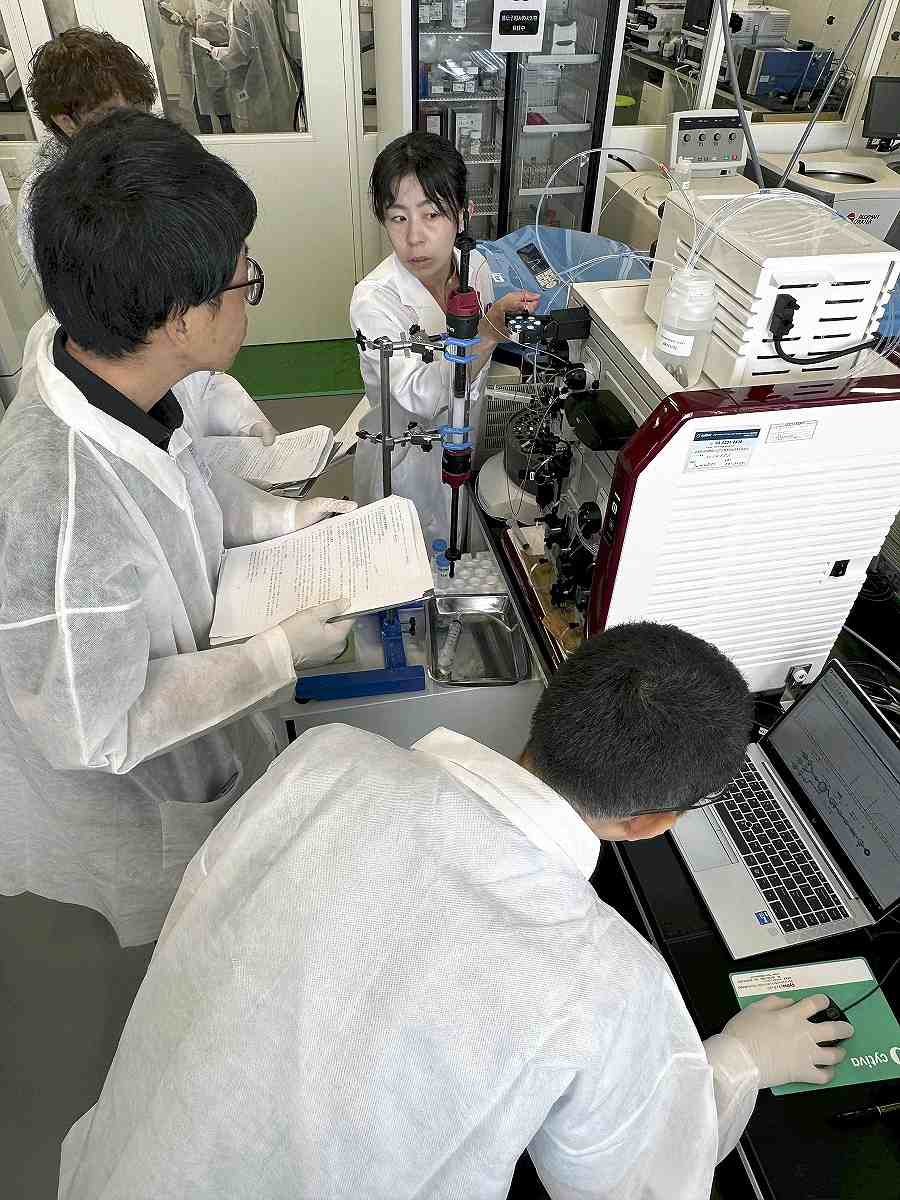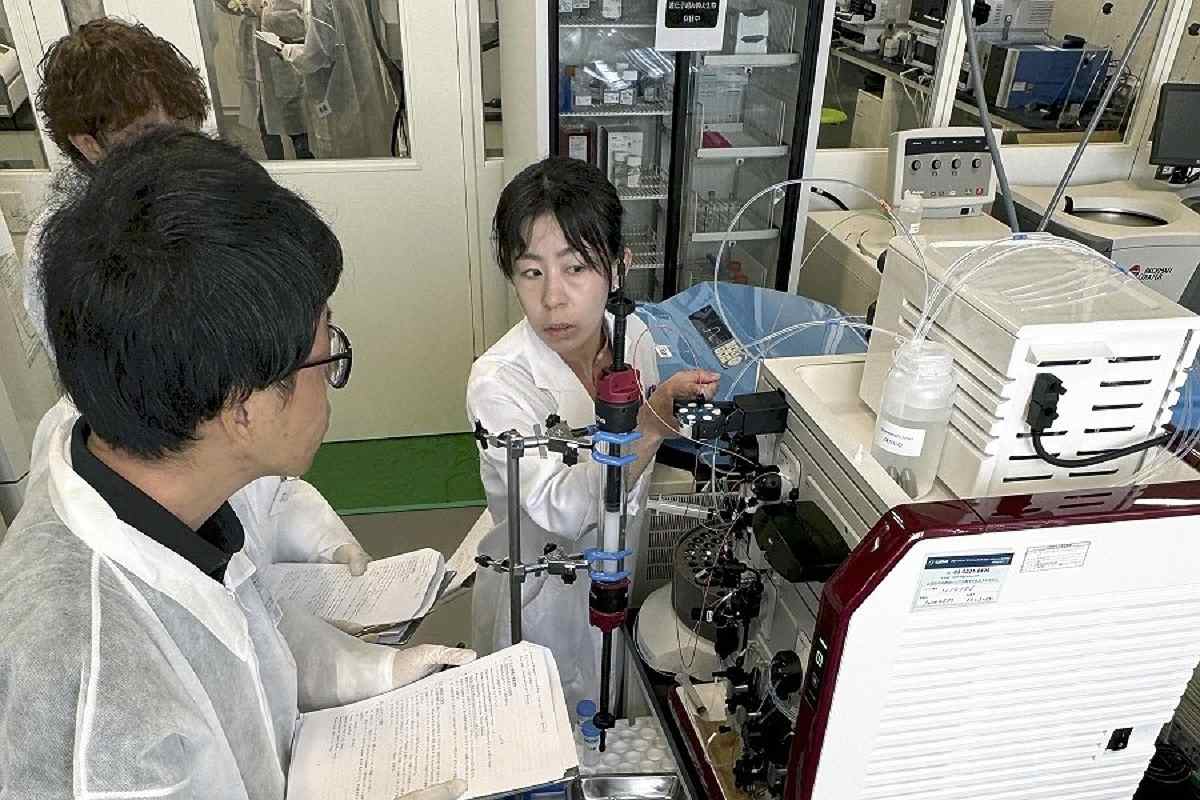
The Yomiuri Shimbun
Pharmaceutical company employees undergo training on biopharmaceutical manufacturing methods at the Biologics Center for Research and Training in Koto Ward, Tokyo.
6:00 JST, July 13, 2025
The government is stepping up efforts to combat the increasingly acute problem of drug loss, in which pharmaceuticals approved overseas are not available in Japan.
Some analyses suggest that the number of unavailable drugs is set to grow even for common diseases like cancers and diabetes.
Japan needs to create an environment in which foreign companies can more easily conduct clinical trials so that patients can receive the drugs they need, and at the same time, it is urgently necessary for Japan to boost its drug development capacity.
“Many patients are facing a tough predicament because new drugs developed overseas that they desperately want aren’t used in Japan,” said Sumito Nishidate, chairman of GISTERS, an organization of people with a rare form of cancer called a gastrointestinal stromal tumor (GIST). “It’s really frustrating.”
One such new drug is avapritinib, which has demonstrated remarkable effects including shrinking tumors in 86% of GIST patients harboring specific genetic mutations. This drug was approved in the United States in 2020, and has since been given the green light in the European Union, South Korea and elsewhere. However, there currently is no plan to begin using avapritinib in Japan.
According to the Health, Labor and Welfare Ministry, as of March 2023, applications for development in Japan had not been filed for 86 of 143 drugs approved in other nations but not in Japan. Drug lag, in which the approval of new drugs to enter Japan’s market is delayed, is increasingly morphing into the more serious problem of drug loss, in which these pharmaceuticals remain unavailable to patients.
In late June, Prime Minister Shigeru Ishiba established the Public-Private Council for Enhancing Drug Discovery Capabilities, and called for the public and private sectors to “cooperate with each other across boundaries” and exchange knowledge to help resolve the drug loss problem.
Officials from U.S. and European pharmaceutical organizations are also involved in the council, which plans to compile a list of specific measures for dealing with the problem by spring 2026. Since May, the health ministry has launched development requests and called on companies to start working on eight drugs, including avapritinib. Domestic corporate groups have stepped up to work on two of these drugs, including a medication for treating severe cases of malaria.
Low appeal of Japanese market
Drug development since the turn of the century has been spearheaded by startup companies mainly in the United States. This has been a factor in Japan’s drug loss problem, because these companies, despite their limited financial resources, can generate the profits they need in the U.S. market alone. Therefore their managers give no consideration to the Japanese market. Forty-eight of the previously mentioned 86 unavailable drugs were developed by overseas startups.
Making newly developed drugs available in a given country requires approval from that nation’s government. To get a drug approved in Japan, pharmaceutical companies must collect necessary data, including through clinical trials in which the drug is administered to Japanese people. However, many observers have pointed out that Japan’s clinical trial and approval procedures are complex and difficult to understand.
The government’s policy of lowering the official prices of pharmaceuticals also has deterred foreign companies from dipping their toes in the Japanese market.
In the past decade, the government has sought to reduce medical expenses by introducing rules including lowering the prices of drugs with annual sales of more than ¥100 billion, and revising official prices for medicines annually rather than every two years. These rules make revenue forecasting more difficult for drugmakers.
“The Japanese market isn’t very attractive,” one observer told The Yomiuri Shimbun.
Problem set to get worse
According to Nobuhiro Arai, a managing director at Boston Consulting Group, Japan’s drug loss problem “will get worse.”
The study by the company showed that of 145 drugs in the final stage of clinical trials or under review for approval in the United States and Europe, almost 70% lacked a plan to make them available in Japan and could potentially end up as drug loss subjects by around 2030. These pharmaceuticals included breakthrough drugs for preventing breast cancer metastasis and recurrence as well as for treating kidney dysfunction triggered by causes such as diabetes.
In 2024, the health ministry set up an office offering consultation services in Washington. Staff at this office will visit startups and explain matters such as clinical trials and the drug approval process in Japan. The office will provide English consultations to companies interested in entering the Japanese market and establish a point of contact where further support can be sought.
Hosei University Prof. Takuma Sugahara, an expert on health economics, said, “It’s vital that the government establishes an environment that will boost enthusiasm for development, such as by enabling foreign startups to smoothly conduct clinical trials and establishing a system in which they can make a decent profit.”
